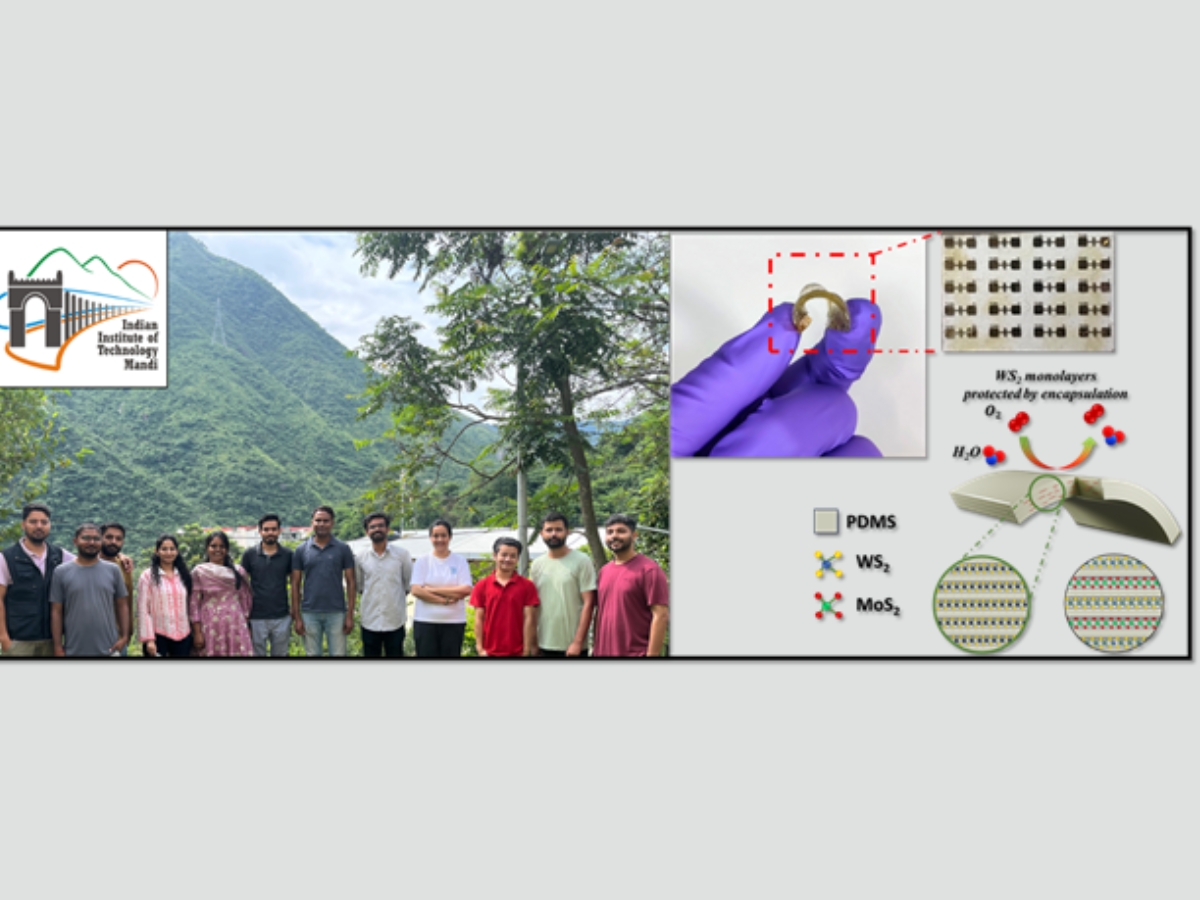IIT Mandi creates WS2 PDMS composite for flexible and wearable electronics
IIT Mandi scientists have developed a WS2–PDMS composite using a water mediated non destructive transfer method, enabling durable and flexible materials for wearable gadgets, bendable smartphones, and medical sensors.

Mandi, August 29, 2025: Globally, there is a major push toward flexible and wearable electronics, ranging from bendable smartphones to medical sensors that can monitor health in real-time. The success of these technologies depends heavily on advanced materials research. Graphene, a thin two-dimensional (2D) material with extraordinary properties, predicted to be the foundation for next-generation devices such as photodetectors, sensors, supercapacitors, and flexible electronics.
However, graphene has many limitations. Over a four-year period, oxidation and degradation of such thin 2D materials (WS2) were observed, leading to poor device efficiency. In addition, transfer techniques like those used for 2D materials often damaged the delicate flakes, resulting in slippage, weak adhesion, and loss of optical or electrical properties.
Join PSU Connect on WhatsApp now for quick updates! Whatsapp Channel
Read Also : NTPC Unchahar Signs MoA with CVPS for TB Awareness and Nutrition Support in RaebareliTo address this, researchers at IIT Mandi developed a ground-breaking WS2 PDMS composite fabrication.
A long-lasting and flexible material that could power the next generation of wearable gadgets, bendable phones, and health-monitoring devices. The development of WS2 PDMS composite fabrication The research, led by Prof. Viswanath Balakrishnan along with Yadu Chandran, Dr. Deepa Thakur, and Anjali Sharma from IIT Mandi, introduces a water-mediated, non- destructive transfer method that enables chemical vapor deposited WS2 (a widely studied semiconductor) monolayers to be sandwiched within PDMS layers.
Speaking about the breakthrough, Prof. Viswanath Balakrishnan, Associate Professor, School of Mechanical and Materials Engineering, IIT Mandi, said “This development a significant milestone toward flexible, wearable electronics from 2D materials. By protecting those atomically thin layers while not giving up their optical or electrical properties, we've defined a scalable, long-lived platform for the next generation of sensors, displays, and health-monitoring.” This research will be helpful in creating wearable health-monitoring sensors, flexible displays and smartphones, solar cells and light-harvesting devices, strain sensors, memristors, optoelectronic systems and quantum technologies such as valleytronics and photon emitters.”
Read Also : HUDCO Signs MoUs over 1 Lakh Crore for India’s Port Infrastructure DevelopmentThe researchers demonstrated that encapsulating monolayer tungsten disulfide (WS2) in polydimethylsiloxane (PDMS) maintained stability for over a year without any signs of oxidation and degradation. Furthermore, the vertical stacking of WS2 PDMS layers enhanced optical absorption by more than fourfold while preserving the intrinsic properties of the monolayers. Additionally, the composite exhibited excellent flexibility and durability, withstanding thousands of bending cycles without delamination and ensuring efficient strain transfer.
Overall, this research addresses a key challenge in using atomically thin materials, their poor stability in air. By developing a simple composite strategy using PDMS, these materials can be preserved for long-term use while maintaining their unique properties. Since they are the foundation for flexible electronics, wearable health monitors, next- generation sensors, and efficient optoelectronic devices, this method directly contributes to technologies that will impact daily life in the near future.
National Importance of the Research
This innovation directly contributes to India’s National Quantum Mission, (an initiative by the Government of India to propel the nation to the forefront of quantum technology research and development with a budget allocation of Rs 6,000 crore) by enabling durable 2D materials that are vital for quantum light sources, single-photon emitters, and secure communication technologies. It also aligns with the growing global demand for flexible electronics, wearable healthcare systems, and energy-efficient devices.
This initiative has the potential to establish India as a global leader in quantum computing, secure communications, and advanced quantum materials. Two- dimensional TMDs can play a pivotal role as single-photon emitters, valleytronics platforms, and quantum light sources, crucial elements of quantum computing and communication. The compatibility of such materials with flexible platforms also opens the possibility of integrated quantum devices on bendable and transparent substrates, offering design advantages that traditional bulk materials cannot achieve.
Practical Implications
The findings lay a strong foundation for building flexible electronics, wearable medical sensors, lightweight solar cells, next-generation strain sensors, and tunable optical devices. Since PDMS is biocompatible, the nanocomposite is especially promising for wearable health monitors that can be directly attached to the human body for real-time tracking. The method also allows vertical stacking of layers to integrate multiple functionalities on a single compact platform. It is scalable, cost-effective, and free of complications, making it suitable for industrial adoption.
One highlight of this research is that the process avoids harmful chemicals, reducing environmental impact. With its long-term vision, the approach can accelerate the development of durable, high-performance devices that fit seamlessly into smart wearables, healthcare technologies, and energy-efficient systems, ultimately benefiting society at large.
Read Also : DMRC Early Metro Services Resumed from today till 3rd Nov